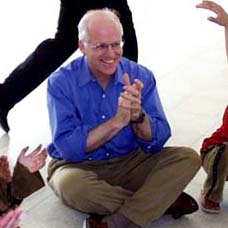2006.08.26: August 26, 2006: Headlines: COS - Micronesia: NorthJersey.com: Micronesia RPCV Cecilia Hartmann has made her life in the South Pacific
Peace Corps Online:
Directory:
Micronesia:
Peace Corps Micronesia :
The Peace Corps in Micronesia:
2006.08.26: August 26, 2006: Headlines: COS - Micronesia: NorthJersey.com: Micronesia RPCV Cecilia Hartmann has made her life in the South Pacific
Micronesia RPCV Cecilia Hartmann has made her life in the South Pacific

After her arrival, Hartmann soon learned her assignment was among the most difficult for Peace Corps workers because the Pacific island is so secluded. At that time, only three flights a week landed there and only an occasional ship. It had no electricity, roads or running water. The only American on the island, she was housed with a family with 10 children. Although English is the second language, Chuukese is the difficult mother language. Despite linguistic difficulties and the huge adjustment of living in a two-room, wood-and-aluminum-roofed shack, Hartmann decided to stay beyond her initial two-year commitment.
Micronesia RPCV Cecilia Hartmann has made her life in the South Pacific
jersey mosaic Paterson native has made her life in the South Pacific
e-mail print
Saturday, August 26, 2006
The year was 1970. The Vietnam conflict was being fought by guerilla fighters in the jungles of Southeast Asia.
That same year, Cecilia Hartmann of Paterson graduated from Seton Hall University in South Orange with a desire to do something positive. So she joined the Peace Corps.
"I wanted to go to Vietnam, but it was off limits," says Hartmann, 61. "I wanted to work with children."
Instead, in 1971, she was sent to Chuuk, a remote island that is the most populous of the four states making up the Federated States of Micronesia. Hartmann now calls Chuuk home, and for the past 25 years she has been teaching school there.
Life was primitive on the lush island bathed by intense tropical sun. Hartmann's mistake was failing to wear sunglasses as protection from the harmful ultraviolet rays. About two years ago, her vision started to blur due to cataracts. The condition deteriorated to the point where she needed an operation not available in Micronesia. She did research on the Internet and returned home to Paterson to stay with her sister and mother. In May, a surgeon at PBI Regional Medical Center in Passaic performed operations on both eyes. She returned to Chuuk in July with perfect vision.
In Paterson, Hartmann's home away from home is the Lakeview section of the city near the Clifton border. The middle-class neighborhood of orderly single-family homes has changed little since Hartmann left it, more than two decades ago.
Her modest Paterson home was luxurious compared to life on Chuuk, which is considered a Third World country. After her arrival, Hartmann soon learned her assignment was among the most difficult for Peace Corps workers because the Pacific island is so secluded. At that time, only three flights a week landed there and only an occasional ship. It had no electricity, roads or running water. The only American on the island, she was housed with a family with 10 children. Although English is the second language, Chuukese is the difficult mother language. Despite linguistic difficulties and the huge adjustment of living in a two-room, wood-and-aluminum-roofed shack, Hartmann decided to stay beyond her initial two-year commitment.
Hartmann says she liked teaching in a much simpler environment.
"I was going to stay anyway because I liked it, but then I met my husband, who was a descendant of some of the early German traders," Hartmann says.
First settled by ancient people sailing east from Asia and north from Polynesia, the islanders were later joined by explorers from Germany, Spain and Japan.
Chuuk's harbor and surrounding waters were heavily bombed by the United States during World War II, an effort to dislodge the Japanese fleet. As a result, the harbor holds the world's largest collection of underwater shipwrecks. Contemporary Chuuk, formerly know as Truk, is now a destination for scuba divers.
Hartmann calls the natural beauty of the island alluring.
"My heart is on the island," she says. "It's a very traditional society, very non-aggressive. It was much simpler with no telephones, no satellites, no computers. The food was different. We ate mostly fish and breadfruit."
That has changed over the years, and Hartmann now has e-mail and Internet access -- when the electricity works. She turned to the Internet when her cataracts needed to be removed. Medical help was available in Hawaii or California, but Hartmann decided to fly nearly 20 hours to New Jersey.
"PBI and Dr. (Michael) Mund answered my e-mails," she says, adding that the doctor was recommended by family and friends. Doctor and patient conferred by e-mail and set a tentative surgery date.
Mund, who is chairman of PBI's ophthalmology division, says the cataracts were removed by a small incision and replaced with new intra-ocular lens implants. He recalls being amazed to learn that Hartmann was e-mailing from a South Pacific island.
"I was very happy and privileged for the opportunity to improve the health of a patient who not only lives a world away, but who had also dedicated herself in improving the lives of others," he says.
Reach Diane Haines at 973-569-7046 or haines@northjersey.com.
When this story was posted in September 2006, this was on the front page of PCOL:





Peace Corps Online The Independent News Forum serving Returned Peace Corps Volunteers
 | He served with honor
One year ago, Staff Sgt. Robert J. Paul (RPCV Kenya) carried on an ongoing dialog on this website on the military and the peace corps and his role as a member of a Civil Affairs Team in Iraq and Afghanistan. We have just received a report that Sargeant Paul has been killed by a car bomb in Kabul. Words cannot express our feeling of loss for this tremendous injury to the entire RPCV community. Most of us didn't know him personally but we knew him from his words. Our thoughts go out to his family and friends. He was one of ours and he served with honor. |
 | Chris Shays Shifts to Favor an Iraq Timetable
In a policy shift, RPCV Congressman Chris Shays, long a staunch advocate of the Bush administration's position in Iraq, is now proposing a timetable for a withdrawal of American troops. How Mr. Shays came to this change of heart is, he says, a matter of a newfound substantive belief that Iraqis need to be prodded into taking greater control of their own destiny under the country’s newly formed government. As Chairman of the House Government Reform subcommittee on national security, he plans to draft a timetable for a phased withdrawal and then push for its adoption. A conscientious objector during the Vietnam War who said that if drafted he would not serve, Chris Shays has made 14 trips to Iraq and was the first Congressman to enter the country after the war - against the wishes of the Department of Defense. |
 | Peace Corps' Screening and Medical Clearance
The purpose of Peace Corps' screening and medical clearance process is to ensure safe accommodation for applicants and minimize undue risk exposure for volunteers to allow PCVS to complete their service without compromising their entry health status. To further these goals, PCOL has obtained a copy of the Peace Corps Screening Guidelines Manual through the Freedom of Information Act (FOIA) and has posted it in the "Peace Corps Library." Applicants and Medical Professionals (especially those who have already served as volunteers) are urged to review the guidelines and leave their comments and suggestions. Then read the story of one RPCV's journey through medical screening and his suggestions for changes to the process. |
 | The Peace Corps is "fashionable" again
The LA Times says that "the Peace Corps is booming again and "It's hard to know exactly what's behind the resurgence." PCOL Comment: Since the founding of the Peace Corps 45 years ago, Americans have answered Kennedy's call: "Ask not what your country can do for you--ask what you can do for your country. My fellow citizens of the world: ask not what America will do for you, but what together we can do for the freedom of man." Over 182,000 have served. Another 200,000 have applied and been unable to serve because of lack of Congressional funding. The Peace Corps has never gone out of fashion. It's Congress that hasn't been keeping pace. |
 | Chris Dodd considers run for the White House
Senator Chris Dodd plans to spend the next six to eight months raising money and reaching out to Democrats around the country to gauge his viability as a candidate. Just how far Dodd can go depends largely on his ability to reach Democrats looking for an alternative to Hillary Clinton. PCOL Comment: Dodd served as a Volunteer in the Dominican Republic and has been one of the strongest supporters of the Peace Corps in Congress. |
 | Peace Corps stonewalls on FOIA request
The Ashland Daily Tidings reports that Peace Corps has blocked their request for information on the Volkart case. "After the Tidings requested information pertaining to why Volkart was denied the position — on March 2 — the newspaper received a letter from the Peace Corps FOIA officer stating the requested information was protected under an exemption of the act." The Dayton Daily News had similar problems with FOIA requests for their award winning series on Volunteer Safety and Security. |
 | PCOL readership increases 100%
Monthly readership on "Peace Corps Online" has increased in the past twelve months to 350,000 visitors - over eleven thousand every day - a 100% increase since this time last year. Thanks again, RPCVs and Friends of the Peace Corps, for making PCOL your source of information for the Peace Corps community. And thanks for supporting the Peace Corps Library and History of the Peace Corps. Stay tuned, the best is yet to come. |
 | History of the Peace Corps
PCOL is proud to announce that Phase One of the "History of the Peace Corps" is now available online. This installment includes over 5,000 pages of primary source documents from the archives of the Peace Corps including every issue of "Peace Corps News," "Peace Corps Times," "Peace Corps Volunteer," "Action Update," and every annual report of the Peace Corps to Congress since 1961. "Ask Not" is an ongoing project. Read how you can help. |
 | RPCV admits to abuse while in Peace Corps
Timothy Ronald Obert has pleaded guilty to sexually abusing a minor in Costa Rica while serving there as a Peace Corps volunteer. "The Peace Corps has a zero tolerance policy for misconduct that violates the law or standards of conduct established by the Peace Corps," said Peace Corps Director Gaddi H. Vasquez. Could inadequate screening have been partly to blame? Mr. Obert's resume, which he had submitted to the Peace Corps in support of his application to become a Peace Corps Volunteer, showed that he had repeatedly sought and obtained positions working with underprivileged children. Read what RPCVs have to say about this case. |
 | Why blurring the lines puts PCVs in danger
When the National Call to Service legislation was amended to include Peace Corps in December of 2002, this country had not yet invaded Iraq and was not in prolonged military engagement in the Middle East, as it is now. Read the story of how one volunteer spent three years in captivity from 1976 to 1980 as the hostage of a insurrection group in Colombia in Joanne Marie Roll's op-ed on why this legislation may put soldier/PCVs in the same kind of danger. Latest: Read the ongoing dialog on the subject. |
Read the stories and leave your comments.

Some postings on Peace Corps Online are provided to the individual members of this group without permission of the copyright owner for the non-profit purposes of criticism, comment, education, scholarship, and research under the "Fair Use" provisions of U.S. Government copyright laws and they may not be distributed further without permission of the copyright owner. Peace Corps Online does not vouch for the accuracy of the content of the postings, which is the sole responsibility of the copyright holder.
Story Source: NorthJersey.com
This story has been posted in the following forums: : Headlines; COS - Micronesia
PCOL34189
33






















